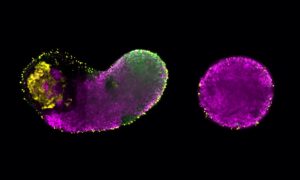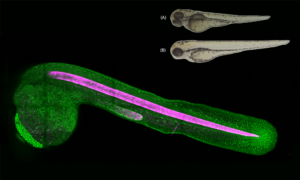
More than 100 new gut bacteria discovered in human microbiome
A new database of bacteria in the human microbiome is the most comprehensive to date.

Scientists at EMBL’s European Bioinformatics Institute (EMBL-EBI), the Wellcome Sanger Institute and Hudson Institute of Medical Research (Australia) have created the most comprehensive archive of human gastrointestinal bacteria to date. The new resource, developed by the Wellcome Sanger Institute, will help identify common patterns and disease associations in future datasets and provide the foundation to develop new ways of treating diseases, gastrointestinal disorders, infections and immune conditions.
In the research, published in the journal Nature Biotechnology, researchers studied faecal samples from 20 people from the UK and Canada, and successfully grew and DNA sequenced 737 individual bacterial strains from these. Analysis of these isolates revealed 273 separate bacterial species, including 173 that had never previously been sequenced. Of these, 105 species had never even been isolated before. Adding this data to all other publicly available human gut bacteria data has created the most comprehensive database of the human microbiome to date: the Human Gastrointestinal Bacteria Genome Collection (HGG).
The new database represents a significant step forward from the previous gold standard set by the Human Microbiome Project (HMP).
Utilising metagenomes
“EMBL-EBI’s role was to bioinformatically assess how comprehensive the HGG database is compared to the HMP,” explains Alexandre Almeida, a postdoctoral fellow at EMBL-EBI and the Wellcome Sanger Institute. “We did that by taking bacterial genomes reconstructed from public human gut metagenome data and assessing how much of that information we were able to classify with the HGG and how much with the HMP. Results showed that the HGG database was much better, providing a 50-60% improvement in classification.”
Looking forward
The new culture collection, and associated genome sequences, will be a useful tool for future research on human gut bacteria, providing a reference against which common patterns and disease associations in follow-up datasets can be identified. It also offers the foundation for identifying new ways of treating gut diseases and conditions such as inflammatory bowel disease and irritable bowel syndrome.
“Having access to the pure isolate genomes is very useful because researchers can use the reference genome data when sequencing their own samples to see which species are present,” explains Rob Finn, a team leader at EMBL-EBI. “Then if they want to test a hypothesis, for example that a particular species is enriched in a certain disease, they can take the isolate into the lab and test if this species seems to be important.”
“If you know that a particular species is essential for health, or maintaining health, then you can introduce that species into the gut of an individual,” adds Almeida. “In the future we hope to be able to modulate specific bacterial communities in the gut.”
To find out more, read the original press release on the Wellcome Sanger Institute website.


